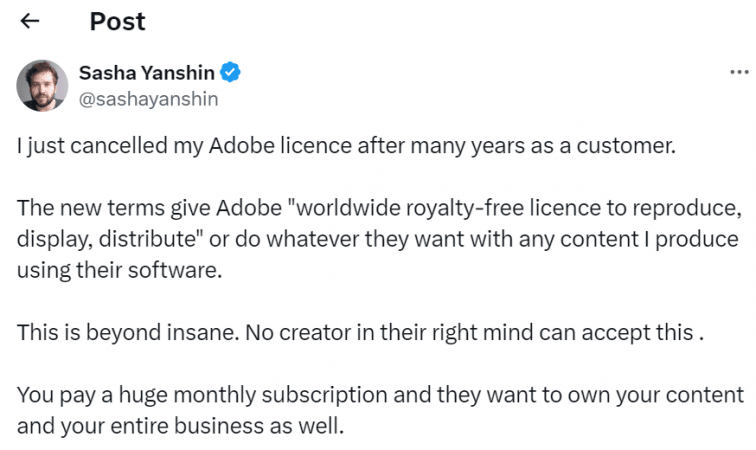
On 6th June 2024, Adobe issued a clarificatory statement amidst an outcry on social media regarding its terms of use in relation to licensing user content.
Users have claimed that upon accepting the updated terms, they effectively consent to and hand over their proprietary creations and material to Adobe as part of a licence, which is non-exclusive and royalty free. The primary concern voiced is that Adobe charges a monthly subscription fee from users and then takes their content for free.
This is likely to pose a complex set of intellectual property questions covering open access, user rights, creativity, consent and profitability.
The ambiguity:
The updated terms state " 4.2 Licences to Your Content. Solely for the purposes of operating or improving the Services and Software, you grant us a non-exclusive, worldwide, royalty-free sublicensable, license, to use, reproduce, publicly display, distribute, modify, create derivative works based on, publicly perform, and translate the Content."

Adobe has sought to clarify what it means to do with creator content licenses under these terms. "To be clear, Adobe requires a limited license to access content solely for the purpose of operating or improving the services and software and to enforce our terms and comply with law, such as to protect against abusive content."
Further on machine learning, Adobe stated "When we analyze your content for product improvement and development purposes, we first aggregate your content with other content and then use the aggregated content to train our algorithms and thus improve our products and services. If you don't want Adobe to use your content for these purposes, you can opt out of content analysis at any time."
While acknowledging Adobe's effort at such clarifications, the continuing confusion amongst users appears to arise while reading the clause text vis a vis its 6th June, 2024 statement. First, users and Adobe subscribers are clearly concerned by the use of words like 'non-exclusive' and 'royalty free' for licences and the further implications. Second, the perception is that Adobe's statement does not appear to directly deal with the above clause text in a substantive manner. Adobe is maintaining a stance that content is primarily used "solely for the purposes of operating or improving the software" and for purposes of 'analysis'.
The questions:
It will be interesting to see how this is likely to play out and whether the terms will be subject to future legal debates. A few issues:
• Ownership vs. Licensing: The terms of use recognise and allow ownership rights of users/creators and simultaneously confer licensing rights of such user content to Adobe. Greater clarity from Adobe may be required on definitive licensing limits or their removal in the actual terms agreed upon by the parties.
• Legal validity: Whether the clarifications issued by Adobe will have any legal validity is to be considered, since they do not constitute a part of the actual agreement between Adobe and its customers.
• Who benefits? Users are concerned about the use of their proprietary content and protection of their rights to profit from such content in the face of such licensing permissions.
• Growth of AI: Adobe cites examples that "In Photoshop, machine learning can be used to automatically correct the perspective of an image for you. With Liquid Mode in Acrobat, we optimize the readability of a PDF by, for example, automatically enhancing a document's headings and tables to help you more easily scroll through and read dense documents." What rights will the user retain as an outcome of such a licencing clause with increasing machine learning and can this be limited?
Newer approaches to Adobe's terms and licensing clarifications could be expected
In an X response to the user concerns, Scott Belsky, Chief Strategy Officer and Executive Vice President, Design & Emerging Products today came to its defence stating "what has become clear: a modern terms of service in the current climate of customer concerns should evolve to address such concerns directly. I have shared this feedback w/ our legal team and they are exploring some new approaches. in the meantime, we wanted to address the changes that were made - and the misunderstandings about why cloud companies require a limited license to host peoples' content and do stuff with it to enable features - via the blog post."














